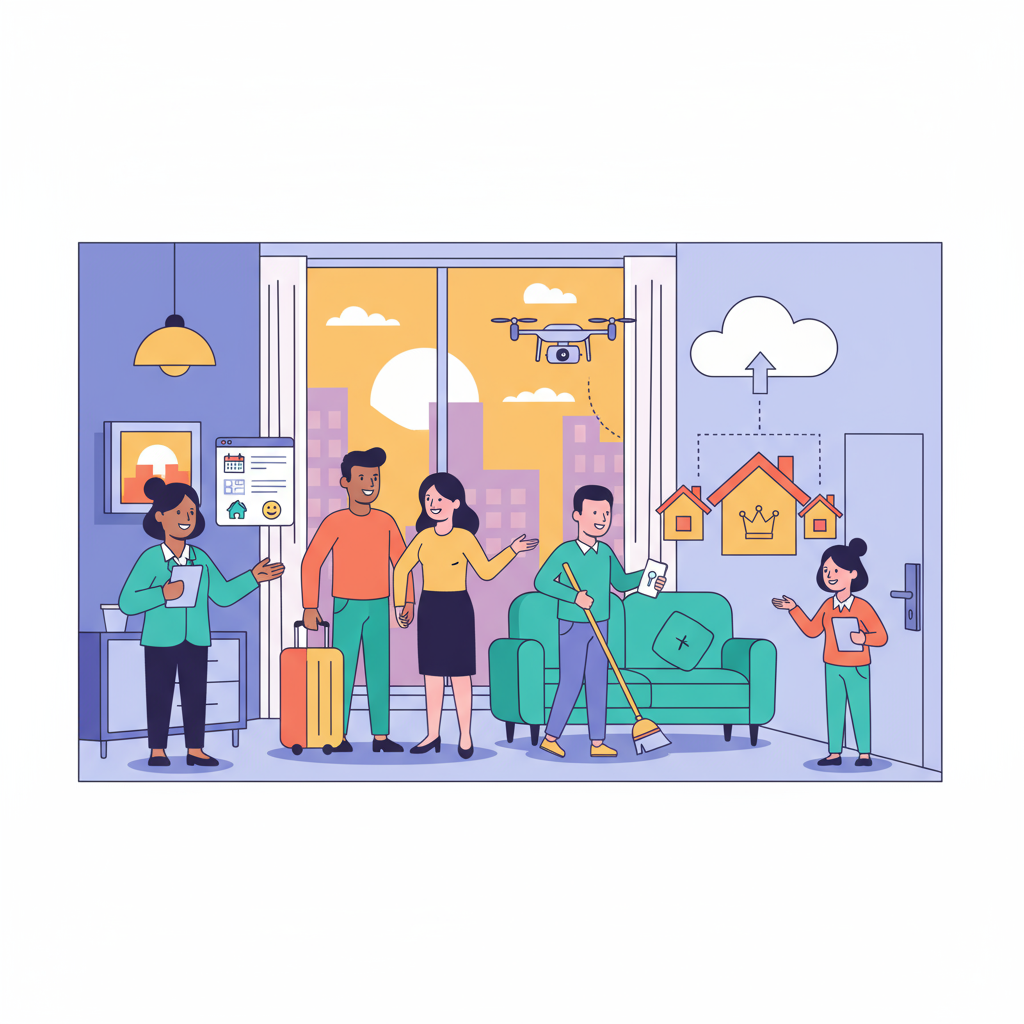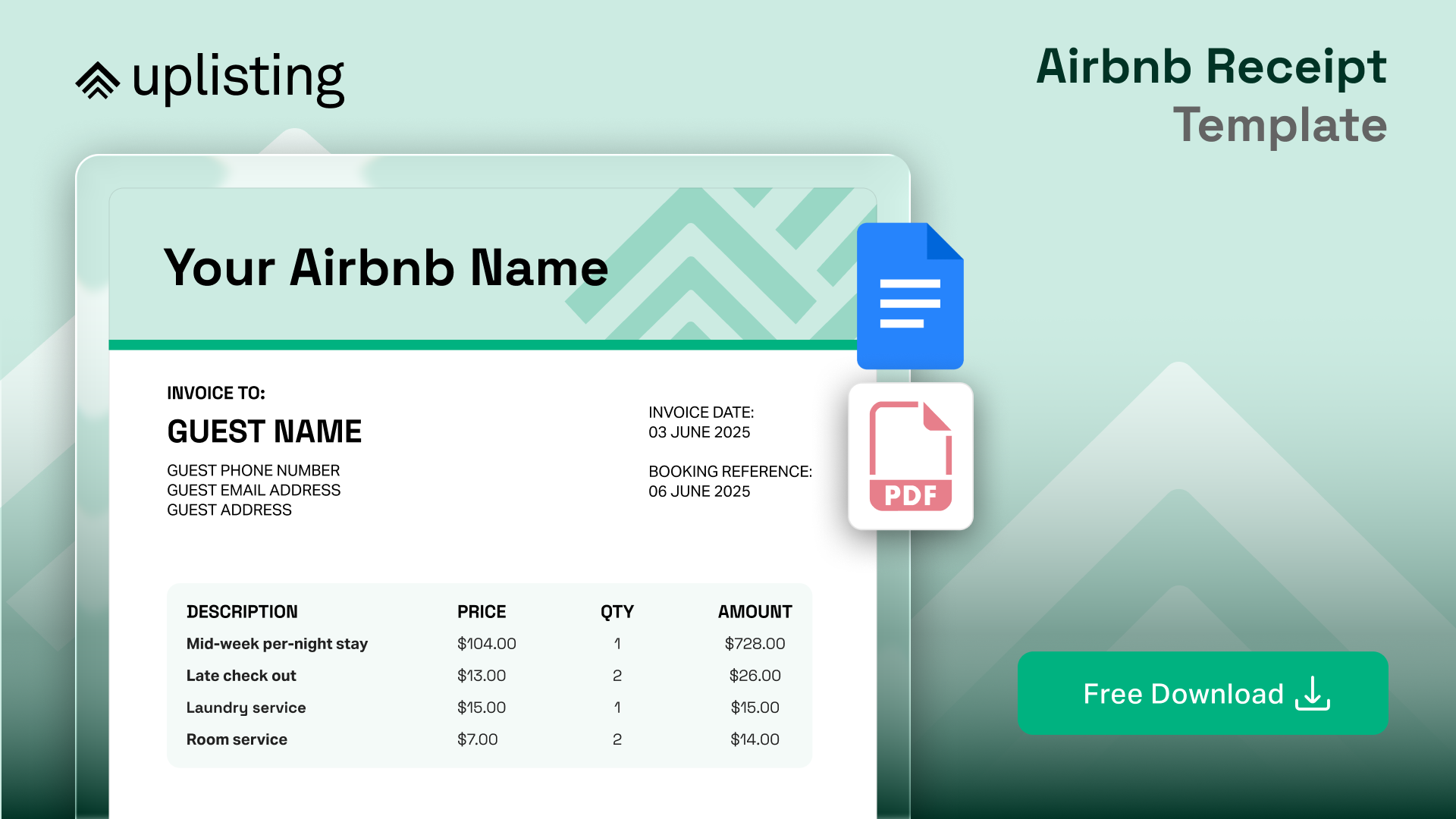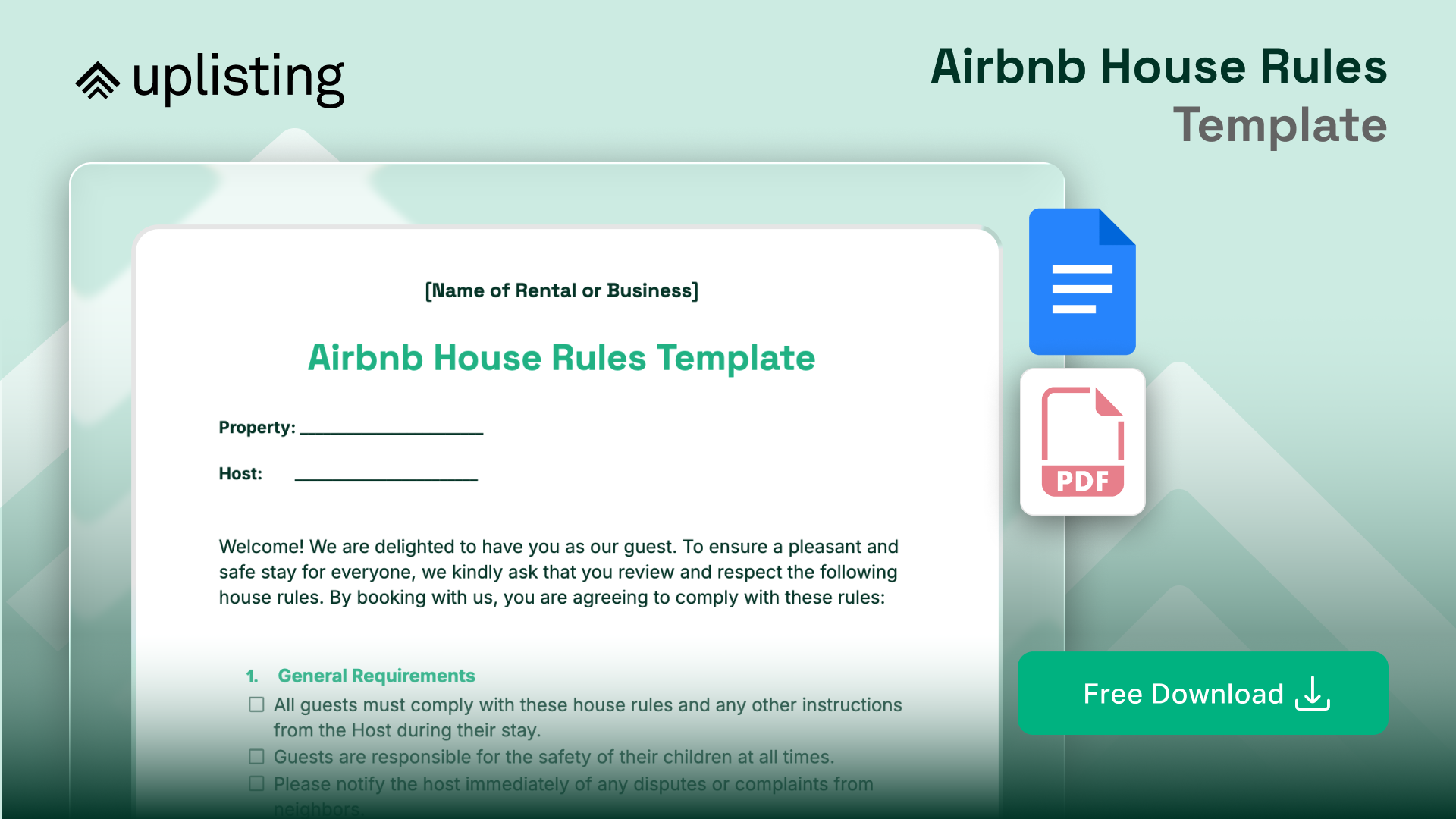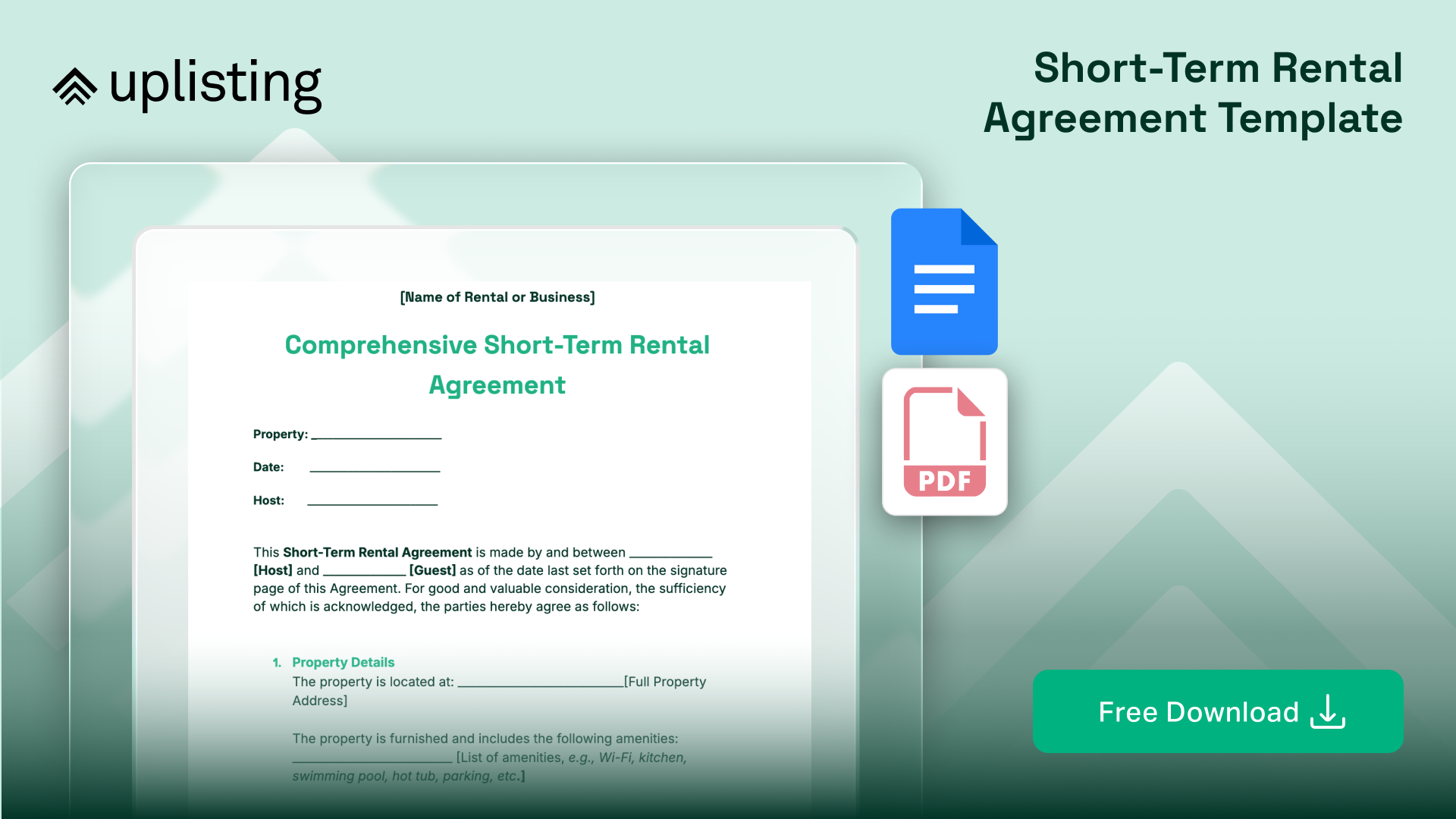Key Takeaways
Short-term rental managers can generate strong income with lower overhead than traditional real estate operations.
The demand for Airbnb property managers is growing as more owners seek passive income from vacation rentals.
A starter Airbnb manager can build a scalable business by focusing on performance, automation, and guest experience.
Managing a short-term rental (STR) sounds simple enough, until you're juggling late check-ins, price adjustments, and guest questions across three platforms at once. Most beginner airbnb managers hit a wall early on: manual processes eat up time, and it’s hard to know which property is actually performing best. Learning how to become an Airbnb manager starts with solving for that chaos.
This guide breaks down what it really means to manage an Airbnb, the income potential, and how to lay the groundwork for a scalable and seamless operation.
Why Become an Airbnb Manager in 2025?
The demand for Airbnb property managers is strong.
Many property owners want the income of a short-term rental without the hassle of operations. That gap creates consistent opportunities for managers who know how to run listings efficiently. From cleaning schedules to pricing updates, property owners are willing to pay a premium for someone who can handle the details and keep the flow of five-star reviews steady.
It’s also a realistic path to future growth. Managing five properties well can lay the foundation for a profitable business with repeat clients, referrals, and direct booking traffic. As you streamline your workflow and automate the right tasks, your time shifts from daily chaos to strategic growth.
Create 5-star guest experiences
Give your guests unforgettable experiences
With Uplisting, you can send the right messages at the right time on all booking sites. Read and respond to guest messages in a single, unified inbox — whether you’re at the office or on the go.
Understanding Roles and Responsibilities
Running STRs means wearing every hat: host, scheduler, cleaner, customer support, and local compliance officer (often all within the same day). The job moves fast, and the learning curve can feel steep. Once you build a rhythm, though, the pieces start clicking into place.
Managing daily operations
Every guest interaction starts with a message.
Questions before booking, confirmation details, check-in instructions, midnight Wi-Fi issues—the messages can add up, and you’re the only one answering. Quick replies build trust. Delays lose bookings. Most guests won’t thank you for a smooth stay, but they’ll definitely say something when communication goes quiet.
Check-ins and check-outs don’t run themselves. Regardless of greeting method, arrivals need to feel seamless and departures should be friction-free. That means assigning turnovers to cleaning crews, double-checking supplies, and staying ahead of maintenance needs.
Creating and maintaining listings
Guests don’t book what they can’t see.
Writing a clear, honest listing with sharp photos and well-defined house rules helps avoid problems later. Descriptions should reflect the reality of the unit's condition and highlight what makes the space worth choosing over the competition.
Pricing needs constant attention as rates shift depending on season, events, and what similar properties are charging. Smart pricing tools help, but you still need to step in when demand spikes or a slow week needs filling.
An organized calendar goes beyond just avoiding double bookings. You’ll want to block off time for deep cleans, repairs, or even a quick break between guests to keep standards high. A few well-timed blocks now can prevent a mess later.
Staying compliant
Knowing how to become an Airbnb manager means knowing where the legal lines are drawn, and staying on the right side of them. Every city has its own rules. Some require rental licenses, others limit how many nights you can host. Ignoring local regulations can lead to fines or (in severe cases) shut down listings.
Airbnb's platform actually comes with its own compliance playbook. Aspiring property managers need to follow their Terms of Service to a tee, which covers everything from guest discrimination policies to listing accuracy.

6 Clear Steps To Get Started
Managing short-term rentals can be a smart way to earn income and build a flexible business, but only if you set things up the right way. From meeting Airbnb’s basic rules to building trust with property owners, each step moves you closer to running a smooth, profitable operation. Here’s how to get started today without getting overwhelmed.
1. Meet Airbnb requirements
You need to be at least 18 years old and have a verified Airbnb account. Once you're in, keeping the account in good standing is non-negotiable. That means following platform policies, responding to guests quickly, and avoiding issues like misleading listings or frequent cancellations. Airbnb tracks everything, and one mistake can affect every listing tied to your name.
2. Gain essential skills
Managing short-term rentals is part hospitality, part logistics, and part customer service. You’re the one guests message when they’re locked out, the sink leaks, or the Wi-Fi drops. Staying calm under pressure matters more than having the perfect welcome basket.
You also need to feel confident using tech tools that help run bookings, adjust pricing, and respond to messages. You don’t need to be a developer, but you do need to manage a calendar, sync platforms, and keep track of performance without relying on guesswork. This is where Uplisting can come in with a unified calendar, automated messaging, and automated reporting.
3. Research local laws and regulations
As we mentioned earlier: do your research. Tax requirements vary by location and can include transient occupancy taxes, income reporting, and business licenses. Guessing your way through compliance usually ends in fines.
Airbnb publishes local guidelines that break down what’s legal by location. Read them. Then check with your local government to confirm what’s changed. Hosts who skip this step often find out the hard way.
Short-term rental regulation information can often be found in the housing, zoning, or city planning sections of your city or county government site. Talking to other hosts in your area is another great way to get the inside scoop on regulations and best strategies for compliance.
(Pro tip: this AirDNA blog offers beginner Airbnb managers an easy way to locate regulatory information.)
4. Build a portfolio
Managing one listing well makes it easier to land the next. Co-hosting is a smart way to get started without taking on full responsibility right away. You handle the day-to-day operations, while the owner manages payouts and reviews. Once you’ve built a track record, you can start approaching more property owners.
Real estate agents, vacation rental investors, and even friends or family with unused properties often look for someone to handle short-term rentals. Most just don’t know where to start, and that gives you an edge if you already know what to do.
5. Set management fees
There are three common ways Airbnb managers charge for their work:
Percentage-based: You take a cut of each booking. This is usually between 15% and 30%, but can often vary depending on a variety of factors. This keeps your income tied to performance, but also means more work during busy seasons.
Fixed-fee: You charge the same amount each month, no matter how many bookings come in. Owners like the stability, but you take the hit if the listing underperforms.
Hybrid model: You set a smaller base fee and take a bonus based on booking volume or guest rating. It gives both sides flexibility while keeping goals aligned.
Whatever you charge for property management fees, make it clear what’s covered.
Are you handling guest communication? Cleaning crew scheduling? Maintenance calls? Set the scope early, or you’ll end up handling every problem without getting paid for it.
6. Automate tasks
Manual tracking doesn’t scale. If you’re managing more than one listing (or plan to in the future), you need to start automating early.
A property management system (PMS) helps centralize bookings, automate guest messages, and keep calendars synced across platforms. You can see performance, upcoming check-ins, and pending payouts in one place instead of switching between apps or spreadsheets.
Dashboards let you spot issues quickly and make smarter decisions about pricing, gaps, and operations. And automated messaging makes sure guests always get clear check-in instructions, even if you’re juggling three turnovers in one day.
If you're serious about learning how to become an Airbnb manager, having a strong grasp on automation best practices will give you a major advantage.
You’re in great company
Sign up
Some of the largest short-term rental operators (with 250+ properties) rely on Uplisting's software to scale their businesses.
Practical Growth Tips
Managing a few listings is a solid start. It’s even enough for some people.
If you're determined to grow past just covering costs or filling weekends, though, you need systems that make your work visible, your service credible, and your operations repeatable. Growth doesn’t start with more properties: it starts with being easier to find and easier to trust.
Build a strong online presence
A simple website with clear service details, the areas you cover, and a contact form is enough to show you’re serious. Include photos from current listings, a short intro about your experience, and a breakdown of what you actually do. Focus on the facts that matter to owners and avoid filler.
Set up a Google Business Profile. It’s free and helps you show up in local searches like “Airbnb management near me.” Use the same name, email signature, and profile details everywhere so people instantly recognize your service when they see it again.
A consistent presence builds trust fast.
Use testimonials and social proof
Guest reviews show your listings are solid. Owner testimonials show you’re worth hiring. Ask current clients to describe how their property performs with you in charge. Focus on the results: more bookings, fewer guest issues, or just peace of mind from not managing the inbox every day.
Numbers help, too. Point to occupancy rate jumps, better nightly rates, or fewer gaps in the calendar. If you’ve taken a listing from weekends-only to fully booked, say that. Clear wins beat vague praise every time.
Photos and screenshots support the story. Share before-and-after photos of a refreshed listing. Post real reviews from guests who stayed after you took over. Even a screenshot of a packed calendar proves you know how to keep bookings rolling.
Scale beyond the first few rentals
Once you're running several listings manually, the margin for error disappears. Ten becomes impossible without structure. If you’re planning to grow, you can’t build new processes every time a property comes in. You need repeatable systems that already work.
Create checklists for onboarding, turnovers, guest communication, and maintenance tracking. Standardize how you handle each step so nothing depends on memory or last-minute texts. When every task has a process, you spend less time fixing problems and more time adding properties.
Then choose a growth path that fits your market:
Expand locally: Focus on a single neighborhood or city to build name recognition and streamline logistics. Fewer moving parts means faster response times and easier scheduling.
Partner with investors: Real estate investors want strong returns, not more tasks. If you can show improved RevPAR or stronger guest reviews, they’ll bring you more properties to manage.
Offer remote co-hosting: If you’ve locked in your messaging, calendar, and pricing systems, you can manage guest-facing tasks for properties in other cities (even if you never step inside).
Scaling means getting out of the weeds. Instead of doing more, you're refining what already works and using it to bring in better properties, better owners, and better margins. That’s the difference between learning how to become an Airbnb manager and building a business that actually runs.
Ready to build a high-performing short-term rental business? Sign up for Uplisting to streamline your vacation rental management.
FAQs About Becoming an Airbnb Manager
Do managers need a real estate license?
Usually, no. Most areas don’t ask for a real estate license when managing short-term rentals, since you're not leasing long-term or selling property. Some cities or states do require a business license or specific registration to manage properties on behalf of owners, especially if you're handling money or acting as the main point of contact. Local governments set the rules, so always check city or county requirements before signing an agreement.
How do managers set commission rates?
Most managers charge between 15% and 30% of the nightly rate, depending on how much work they take on. Lower rates cover basics like guest messaging and calendar updates. Higher percentages usually include full-service support: cleaning schedules, maintenance calls, restocking, and price adjustments.
Some markets influence the rate, too:
Busy urban areas with frequent bookings: More guest turnover means more work, and these rates typically land between 20% and 30%.
Vacation homes with longer stays: Fewer turnovers allow for leaner operations. Rates often sit between 15% and 20%.
Remote properties with access issues: Harder logistics justify a higher rate to cover extra coordination.
Owners want clarity. Break down what your percentage covers so there’s no guesswork.
What if a guest damages the property?
Go straight to Airbnb’s Resolution Center., You’ll need to gather proof to file a claim: clear photos, videos, receipts, and a short explanation of what happened. Submit the claim within 14 days of check-out or before the next guest arrives, whichever comes first.
Airbnb lets you add a security deposit to listings via your PMS, but keep in mind the platform doesn’t collect funds upfront. If damage occurs, you’ll still need to request the amount through the Resolution Center.
Quick inspections after check-out help catch issues early. Set clear house rules, document everything, and act fast. Waiting too long usually means the claim gets denied.
Is it possible to manage properties remotely?
Yes—and it works well with the right systems in place.
Automated guest messages, synced calendars, and dynamic pricing tools take care of most day-to-day tasks. Smart locks give guests easy access, and cameras at entry points help confirm check-ins without needing to be on-site.
You’ll still need local help. Reliable cleaners, handymen, and restockers are non-negotiable. Many remote managers keep a shared calendar for cleanings and use group chats or task apps to stay aligned with the team.
Starting remote? Build a small network first. Once that’s solid, the rest becomes easier to manage.
How do managers handle guest refunds?
When a guest reports a problem (anything from a broken heater to an inaccurate amenity) you’ll need to respond fast. Airbnb gives guests a short window to request refunds, and the platform expects hosts and managers to try resolving issues before Airbnb steps in.
The refund process starts with a conversation. Offer solutions quickly, and keep all messages inside Airbnb’s platform. If a refund makes sense, propose an amount directly. If not, explain why and show what you’ve done to fix the issue.
Refunds don’t always mean money. Sometimes, a quick fix or a goodwill gesture prevents escalations. Acting quickly keeps the review clean and avoids losing future bookings.

















.png)

